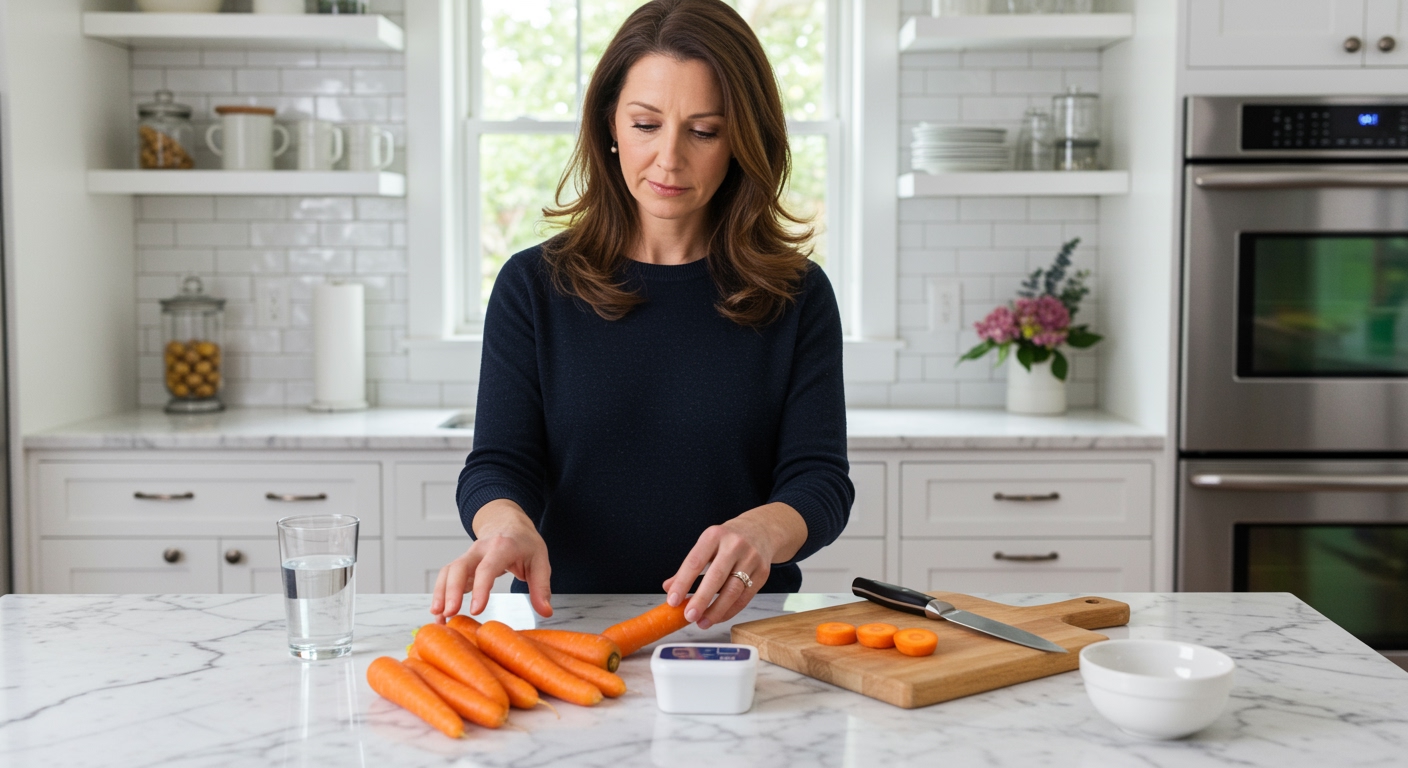✪ Key Takeaway: Low blood pressure patients do not need to avoid carrots as they provide beneficial nutrients without significantly lowering blood pressure.
Introduction
You reach for a carrot stick during your afternoon snack and suddenly wonder if this innocent vegetable could make your already low blood pressure even worse.
Many people with low blood pressure worry about every food choice because they fear certain vegetables might drop their numbers further into dangerous territory.
Hi, I’m Abdur, your nutrition coach and today I’m going to explain exactly how carrots affect blood pressure and whether you should include them in your low blood pressure management plan.
What Do Carrots Actually Do To Blood Pressure?
Carrots contain potassium and fiber that work together to support healthy blood pressure regulation rather than dramatically lowering it.
The potassium content in one medium carrot provides about 230 milligrams, which helps your kidneys balance sodium levels in your bloodstream.
This mineral works by allowing your blood vessels to relax slightly, but the effect is gentle and gradual rather than sudden or severe.
Research shows that foods rich in potassium help maintain stable blood pressure rather than causing dramatic drops that could worsen hypotension.
The fiber in carrots also supports cardiovascular health by helping your body process nutrients more efficiently without creating sudden changes in blood pressure.
✪ Fact: One medium carrot contains only 2% of your daily potassium needs, making it unlikely to cause significant blood pressure changes.
Why Low Blood Pressure Patients Need Nutrients From Carrots?
Your body needs beta-carotene from carrots to produce vitamin A, which supports healthy blood vessel function and circulation.
Low blood pressure often indicates that your cardiovascular system needs extra nutritional support to maintain optimal function.
The antioxidants in carrots help protect your blood vessels from damage that could worsen circulation problems associated with hypotension.
These nutrients work at the cellular level to strengthen your blood vessel walls and improve their ability to respond to changes in blood flow.
Carrots also provide natural sugars that give your body steady energy without causing the blood sugar spikes that can affect blood pressure regulation.
The combination of vitamins, minerals, and fiber in carrots supports your overall cardiovascular health rather than working against your blood pressure management goals.
✪ Pro Tip: Eat carrots with a small amount of healthy fat like olive oil to maximize beta-carotene absorption.
How Should You Include Carrots In Your Low Blood Pressure Diet?
Start with small portions of carrots and monitor how your body responds over several days before increasing your intake.
Raw carrots provide more concentrated nutrients, while cooked carrots are easier to digest and may be gentler on your system.
Pair carrots with protein sources like nuts or cheese to create balanced snacks that support stable blood pressure throughout the day.
The natural sodium content in carrots is minimal, so you can add a pinch of sea salt if your doctor recommends increasing sodium intake for low blood pressure.
Include carrots as part of balanced meals rather than eating them alone to prevent any potential blood sugar fluctuations that might affect your blood pressure.
Track your blood pressure readings when you add carrots to your diet to ensure they support rather than interfere with your management plan.
✪ Note: Always consult your healthcare provider before making significant dietary changes when managing low blood pressure.
What Foods Should Low Blood Pressure Patients Actually Avoid?
Focus your attention on avoiding excessive caffeine and alcohol rather than worrying about nutrient-rich vegetables like carrots.
Large amounts of caffeine can cause your blood pressure to spike temporarily and then drop lower than before, creating dangerous fluctuations.
Alcohol acts as a vasodilator, meaning it widens your blood vessels and can cause your already low blood pressure to drop further.
Very high-potassium foods like bananas in large quantities might be more concerning than carrots, but even these require excessive consumption to cause problems.
Processed foods with artificial additives can interfere with your body’s natural blood pressure regulation mechanisms more than whole foods ever could.
The real concern should be dehydration and inadequate nutrition rather than avoiding healthy vegetables that support your overall cardiovascular health.
✪ Fact: Dehydration causes more blood pressure problems for hypotensive patients than any single food choice.
The Bottom Line
Carrots are safe and beneficial for people with low blood pressure because they provide essential nutrients without causing dangerous drops in blood pressure readings.
Nutrition should support your health goals, not create unnecessary fear around wholesome foods that your body needs to function properly.
Share your experiences with carrots and low blood pressure in the comments below, and let me know if you have questions about other foods that concern you in your blood pressure management journey.
References
At NutritionCrown, we use quality and credible sources to ensure our content is accurate and trustworthy. Below are the sources referenced in creating this article:





